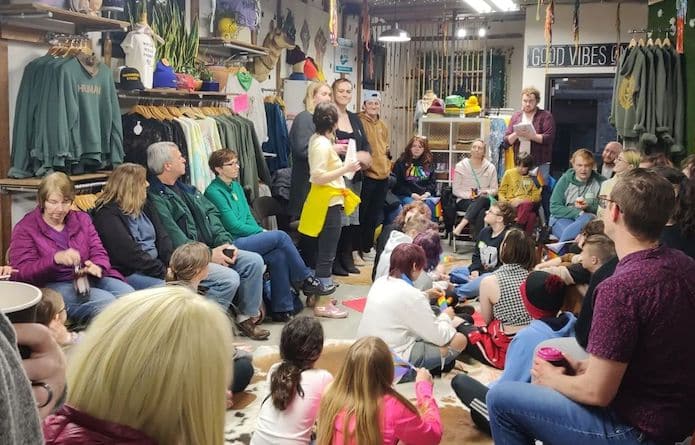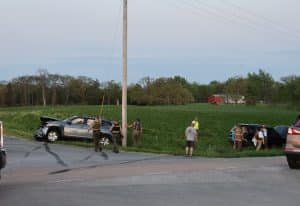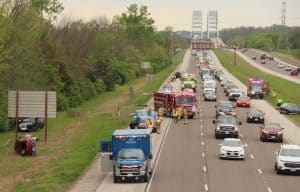Fallout from WHS restroom debate

Several developments have occurred in the week following the conflict regarding transgender students’ use of restrooms at Waterloo High School.
Last Wednesday, the Waterloo School Board shared another letter to the district following protests at WHS, a school board meeting with 26 speakers from the public and plentiful talk within the community.
The letter was signed by Waterloo Superintendent of Schools Brian Charron and Waterloo School Board President Lori Dillenberger.
In the letter, Charron and Dillenberger opened by thanking the community for the substantial turnout to its regular school board meeting last Monday, with over 100 individuals in attendance and 275 viewers on the Zoom video stream.
Responding to criticism received by the school board’s lack of response following the public comment section of the meeting, the letter explained that the board had not planned to offer its own comment until after the meeting – something the district’s legal representative had said prior to the first speaker.
The letter adds that the board returned to closed session following the public portion of the meeting in order to discuss concerns expressed among the community.
The letter goes on to list three items currently receiving the board’s attention.
First among these is the possibility of changes to the current restroom setup in the school district. The lack of privacy around urinals in the male restroom was specifically mentioned as a concern, with requests pending for district architects to make proposals on developing gender neutral bathrooms.
Reviewal and adjustment of board policy was also mentioned, with the board hoping to develop policy that, among other things, “recognizes the rights of all people, regardless of gender identity,” and “provides clarity to administrators, parents and students regarding gender issues in schools.”
Finally, the letter stated that the board will be surveying parents, students and staff in order to better understand the issue and “pursue additional options that ensure safety and privacy in our school environment.”
The letter concluded by addressing concerns expressed about the district’s communication on the situation.
While, as the letter says, the district “believes that we’ve been open about transgender issues as we have navigated them over the past eight years,” it also offered a link to a Google document which features a Q&A for questions the district has received concerning transgender bathroom accommodations.
The document, which can be accessed in the online version of this article at republictimes.net, explains that the district has offered such accommodations since 2017, and there currently exists a formal process by which the district recognizes students as transgender and thus allows them to access these accommodations.
Specifically regarding student protests which took place March 17 and March 20, the document explains that students were not disciplined for participating in the protests but were marked tardy or absent from class but excused March 17 and not excused March 20.
The document also indicates that harassment among students was seemingly one-sided amid the protests, with several reports made then by transgender students concerning “derogatory and harassing statements.”
No reports about transgender students harassing non-transgender students during the protest were received until last Monday’s board meeting, and these allegations will be investigated.
On Friday, downtown Waterloo store Philomena+Ruth hosted a Waterloo Listens event meant to show support for the local queer community – particularly those students impacted by the WHS protests and remarks of the week prior.
The event received substantial attendance, with many individuals packing into the shop.
Several event attendees were members of the WHS Diversity Club who spoke about some of what they have experienced both recently and in the school district in general.
Several of them commented on the outpouring of support received by members of the community in the form of letters and other gifts.
One student remarked there “wasn’t a dry eye” as the group had gathered to read notes from the community, including several from younger students in the district.
Another student, who said he’d been in the district since the fourth grade, said he’d found Waterloo to be rather unwelcoming to begin with – an issue that got even worse as he came to understand his identity.
He and other students spoke about recent issues they’ve had at the high school, particularly when it comes to harassment in the restrooms.
“It’s kind of gotten to the point where we’ve had to resort to almost like a buddy system in the bathrooms, which I think, we’re in a high school, we’re sophomores, juniors. That isn’t something that we should be doing in high school,” this student said.
The students also commented on the circulating rumor about transgender boys using urinals with a funnel.
They said that this was false, suggesting it was an uncredible rumor seemingly started by a freshman.
Among the other attendees at Friday’s gathering were several groups from in and out of the community including PFLAG Edwardsville, several representatives from the Monroe County Democrats and speakers from Metro Trans Umbrella Group, a nonprofit transgender support, advocacy and educational group based in the St. Louis area.
Speaking on behalf of MTUG was Gibault graduate Abby Mueller, who serves as a peer advisor for the organization.
Along with answering questions posed by members of the audience, Mueller commented on the importance of listening to the voices of trans people, helping them thrive and trying to better understand trans issues.
“We could talk for hours about laws and policies, but we can’t forget that these are people, real human beings who are struggling just to exist,” Mueller said.
They went on to recall something another MTUG community member had said recently at a 19-year-old’s memorial: “If they could understand just 1 percent of the hurt this community is going through, they would completely stop what they are doing.”
Another speaker was Courtney Fallon, a WHS graduate currently living in Colorado.
They spoke about their own poor experience in Waterloo, remarking positively on the change that appears to have occurred in the community since their graduation in 2016.
“I think one of the things that I thought when I turned 18 and graduated high school was ‘I gotta get the heck out of here,’” Fallon said, “and seeing a lot of the activism and allyship, support and just willingness to understand… that’s such a wonderful, incredible thing that’s happening in our community.”
Fallon further commended the WHS Diversity Club members as well as those present at the event for their efforts toward making Waterloo more welcoming for queer individuals.
“The work that y’all are doing is helping make Waterloo a place that is more welcoming for LGBTQ+ people, for trans people,” Fallon said, “and these are words that I never thought that I would be saying growing up in the environment that I did.”
Another speaker present at the meeting was Rebecca Gibson, who said she was the founder of the WHS GSA – the Genders & Sexualities Alliance group now known as WHS Diversity Club.
Gibson, too, remarked on how queer students at the school have pushed to make a place for themselves.
“I founded the GSA in Waterloo, and it makes me really emotional that you guys are here and that you guys are loud and you’re proud,” Gibson said.
In related news, the Illinois House recently passed a bill that would allow businesses, universities and other building owners to designate multi-occupancy all-gender bathrooms if they choose to do so.
Illinois law already allows for gender neutral single-occupancy bathrooms, but this bill also allows for bathrooms that accommodate two or more individuals.
Standards for these bathrooms specified in the bill include “inclusive signage” that does not indicate any specific gender, lockable stall dividers and partitions for each urinal if urinals are present.






